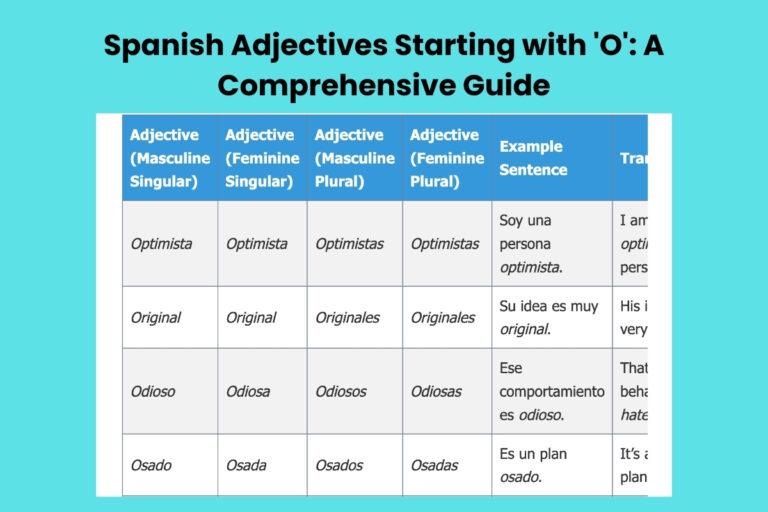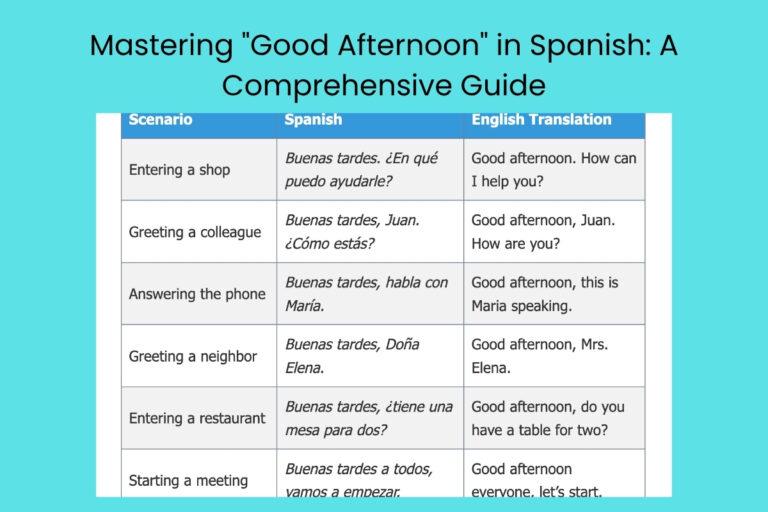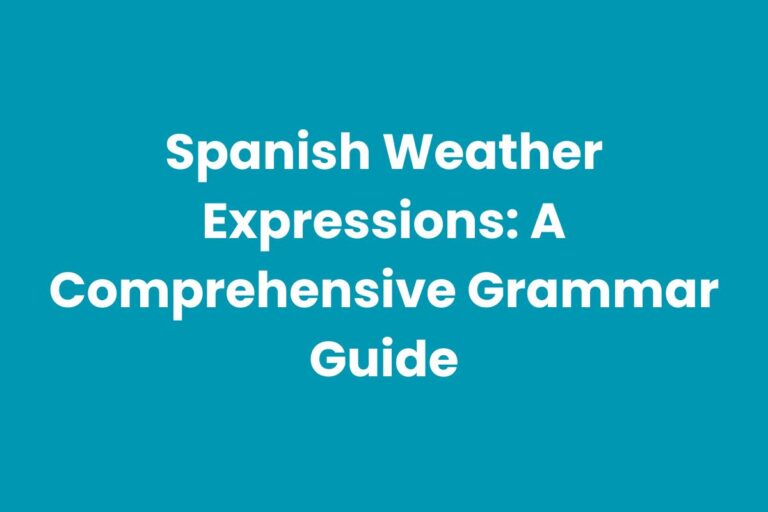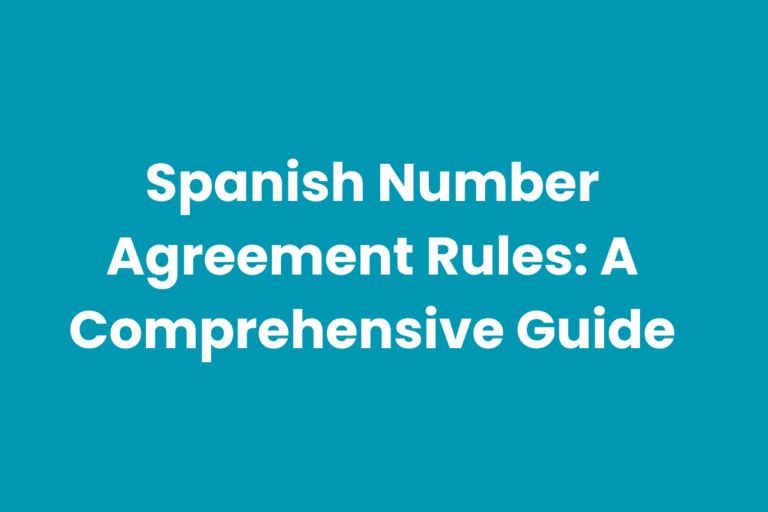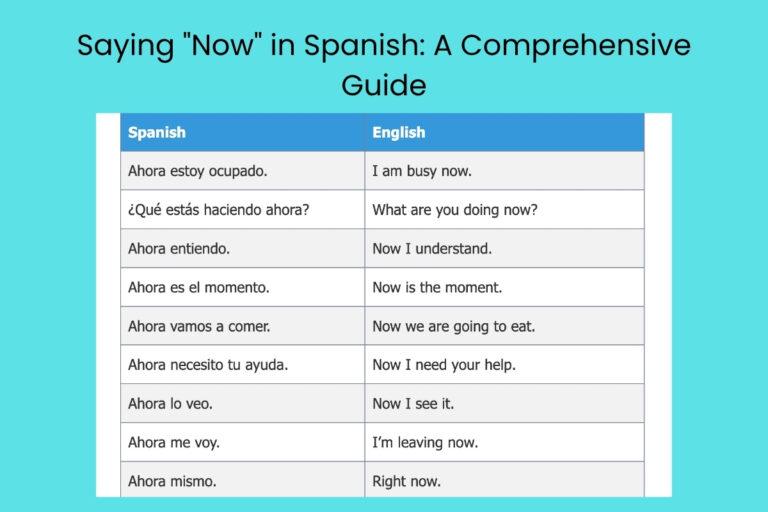Growing in Spanish Past Tense: A Comprehensive Guide
Understanding how to express growth in the past tense in Spanish is crucial for narrating events, describing changes, and conveying personal experiences. The Spanish language offers several past tenses, each with its own nuances and applications.
Mastering these tenses allows you to accurately and effectively communicate how something or someone developed or progressed over time. This guide provides a comprehensive overview of the Spanish past tenses used to describe growth, suitable for learners of all levels seeking to enhance their fluency and grammatical accuracy.
Table of Contents
- Introduction
- Definition of “Growing” in Spanish Past Tense
- Structural Breakdown of Past Tense Conjugations
- Types and Categories of Past Tenses for Growth
- Examples of “Growing” in Spanish Past Tense
- Usage Rules for Past Tenses of Growth
- Common Mistakes
- Practice Exercises
- Advanced Topics
- FAQ
- Conclusion
Definition of “Growing” in Spanish Past Tense
The concept of “growing” in Spanish, when expressed in the past tense, encompasses the idea of something or someone undergoing a process of development, increase, or maturation over a period of time that occurred before the present moment. In Spanish, several past tenses can be used to convey this idea, each with subtle differences in meaning and usage.
The verb most commonly associated with “growing” is crecer. However, other verbs like desarrollar (to develop), aumentar (to increase), and madurar (to mature) can also be used depending on the specific context. The choice of tense depends on whether you want to emphasize the completion of the growth (Preterite), the ongoing nature of the growth (Imperfect), the recent completion of the growth (Perfect), or the completion of the growth prior to another past event (Pluperfect).
Classification: The concept of “growing” in the past tense falls under the category of verbs expressing change, development, or progress. It is crucial to understand the nuances of each tense to accurately convey the intended meaning.
Function: The function of expressing “growing” in the past tense is to describe how something or someone has evolved or matured over time. This can involve physical growth, emotional development, or the increase in size, quantity, or intensity.
Contexts: The concept of “growing” in the past tense can be used in a wide range of contexts, including:
- Describing a child’s physical growth.
- Narrating the development of a company or project.
- Recounting the maturation of a skill or talent.
- Explaining the increase in population or resources.
Structural Breakdown of Past Tense Conjugations
Understanding the structure of past tense conjugations is essential for accurately using the verb crecer and its synonyms in Spanish. The conjugation patterns vary depending on the tense and the verb ending (-ar, -er, -ir). Let’s break down the conjugations of crecer in the four main past tenses:
- Preterite (Pretérito Indefinido): Used for completed actions in the past.
- Imperfect (Pretérito Imperfecto): Used for ongoing or habitual actions in the past.
- Perfect (Pretérito Perfecto Compuesto): Used for actions completed recently or with relevance to the present.
- Pluperfect (Pretérito Pluscuamperfecto): Used for actions completed before another action in the past.
Below are the conjugations for the verb crecer in each of these tenses:
| Pronoun | Preterite (Crecí) | Imperfect (Crecía) | Perfect (He crecido) | Pluperfect (Había crecido) |
|---|---|---|---|---|
| Yo (I) | Crecí | Crecía | He crecido | Había crecido |
| Tú (You, informal) | Creciste | Crecías | Has crecido | Habías crecido |
| Él/Ella/Usted (He/She/You, formal) | Creció | Crecía | Ha crecido | Había crecido |
| Nosotros/Nosotras (We) | Crecimos | Crecíamos | Hemos crecido | Habíamos crecido |
| Vosotros/Vosotras (You, informal plural) | Crecisteis | Crecíais | Habéis crecido | Habíais crecido |
| Ellos/Ellas/Ustedes (They/You, formal plural) | Crecieron | Crecían | Han crecido | Habían crecido |
Note: The Perfect and Pluperfect tenses are compound tenses, meaning they use the auxiliary verb haber (to have) conjugated in the present and imperfect tenses, respectively, plus the past participle of the main verb (crecido). The past participle is formed by adding -ido to the stem of -er and -ir verbs. For -ar verbs, the past participle is formed by adding -ado (e.g., hablar becomes hablado).
Types and Categories of Past Tenses for Growth
As mentioned earlier, Spanish offers several past tenses to express the idea of growth, each with its specific usage and connotation. Understanding these nuances is crucial for effective communication.
Preterite (Pretérito Indefinido)
The Preterite tense is used to describe actions that were completed at a specific point in the past. It emphasizes the finished nature of the action.
When describing growth, the Preterite indicates that the growth happened and concluded within a defined period.
Example: El niño creció rápidamente el año pasado. (The child grew quickly last year.) This sentence implies that the growth occurred during a specific time frame (last year) and is now complete.
Imperfect (Pretérito Imperfecto)
The Imperfect tense is used to describe ongoing or habitual actions in the past. It does not specify when the action began or ended, focusing instead on the process or state of being.
When describing growth, the Imperfect indicates that the growth was happening continuously or repeatedly over a period of time.
Example: Ella crecía en un ambiente familiar muy cariñoso. (She was growing up in a very loving family environment.) This sentence emphasizes the continuous process of growing up within a specific context.
Perfect (Pretérito Perfecto Compuesto)
The Perfect tense is used to describe actions that have been completed recently or have relevance to the present. It connects the past action to the present moment.
When describing growth, the Perfect indicates that the growth has occurred and has a current impact or is still relevant.
Example: He crecido mucho como persona desde que empecé a trabajar aquí. (I have grown a lot as a person since I started working here.) This sentence highlights the growth that has occurred and its ongoing relevance to the speaker’s present state.
Pluperfect (Pretérito Pluscuamperfecto)
The Pluperfect tense is used to describe actions that were completed before another action in the past. It is often referred to as the “past of the past.” When describing growth, the Pluperfect indicates that the growth had occurred before another past event.
Example: Cuando llegué a la ciudad, ya había crecido mucho. (When I arrived in the city, it had already grown a lot.) This sentence emphasizes that the city’s growth was completed before the speaker’s arrival.
Examples of “Growing” in Spanish Past Tense
To further illustrate the usage of each past tense, let’s examine several examples using the verb crecer and its synonyms.
Preterite Examples
The following table provides examples of using the Preterite tense to describe completed instances of growth in the past.
| Sentence | Translation |
|---|---|
| El árbol creció diez metros en cinco años. | The tree grew ten meters in five years. |
| Mi hijo creció cinco centímetros el verano pasado. | My son grew five centimeters last summer. |
| La empresa creció rápidamente después de la inversión. | The company grew rapidly after the investment. |
| La población de la ciudad creció un 20% en la última década. | The city’s population grew by 20% in the last decade. |
| El interés en el tema creció después de la publicación del artículo. | The interest in the topic grew after the publication of the article. |
| La demanda de productos orgánicos creció significativamente. | The demand for organic products grew significantly. |
| El precio de la vivienda creció exorbitantemente el año pasado. | The price of housing grew exorbitantly last year. |
| Su confianza creció después de ganar el premio. | His/Her confidence grew after winning the award. |
| La influencia de la organización creció con el tiempo. | The organization’s influence grew over time. |
| El imperio creció gracias a sus conquistas. | The empire grew thanks to its conquests. |
| La tensión creció entre los dos países. | The tension grew between the two countries. |
| El tumor creció rápidamente a pesar del tratamiento. | The tumor grew rapidly despite the treatment. |
| La deuda creció hasta niveles insostenibles. | The debt grew to unsustainable levels. |
| La popularidad del cantante creció tras su presentación. | The singer’s popularity grew after his/her performance. |
| El desempleo creció durante la crisis económica. | Unemployment grew during the economic crisis. |
| La fama de la película creció de boca en boca. | The movie’s fame grew by word of mouth. |
| El negocio creció gracias a sus estrategias innovadoras. | The business grew thanks to its innovative strategies. |
| El número de estudiantes creció en la universidad. | The number of students grew in the university. |
| La necesidad de ayuda humanitaria creció después del desastre. | The need for humanitarian aid grew after the disaster. |
| La conciencia ambiental creció entre los jóvenes. | Environmental awareness grew among young people. |
| El rumor creció y se convirtió en una noticia. | The rumor grew and became news. |
| La fortuna del empresario creció rápidamente. | The businessman’s fortune grew rapidly. |
| El amor entre ellos creció con los años. | The love between them grew over the years. |
Imperfect Examples
The following table provides examples of using the Imperfect tense to describe ongoing or habitual growth in the past.
| Sentence | Translation |
|---|---|
| Cuando era niño, crecía jugando en el parque. | When I was a child, I was growing up playing in the park. |
| Ella crecía aprendiendo de sus errores. | She was growing by learning from her mistakes. |
| El jardín crecía exuberante con el sol de la mañana. | The garden was growing lush with the morning sun. |
| La ciudad crecía sin planificación urbana. | The city was growing without urban planning. |
| La empresa crecía constantemente cada año. | The company was growing steadily each year. |
| Su interés por la música crecía día a día. | His/Her interest in music was growing day by day. |
| El río crecía durante la temporada de lluvias. | The river was growing during the rainy season. |
| Su confianza en sí mismo crecía a medida que superaba desafíos. | His/Her self-confidence was growing as he/she overcame challenges. |
| La demanda de energía renovable crecía rápidamente. | The demand for renewable energy was growing rapidly. |
| La conciencia sobre el cambio climático crecía entre la población. | Awareness about climate change was growing among the population. |
| La tensión entre los dos países crecía a medida que pasaba el tiempo. | The tension between the two countries was growing as time passed. |
| El número de usuarios en la plataforma crecía exponencialmente. | The number of users on the platform was growing exponentially. |
| La influencia de la cultura latina crecía en la ciudad. | The influence of Latin culture was growing in the city. |
| La necesidad de servicios sociales crecía con la crisis. | The need for social services was growing with the crisis. |
| El amor entre ellos crecía con cada experiencia compartida. | The love between them was growing with each shared experience. |
| La popularidad del programa crecía entre los jóvenes. | The popularity of the program was growing among young people. |
| La importancia de la educación crecía en la sociedad. | The importance of education was growing in society. |
| El costo de vida crecía constantemente en la ciudad. | The cost of living was growing steadily in the city. |
| La presión sobre los recursos naturales crecía con la población. | The pressure on natural resources was growing with the population. |
| La esperanza de vida crecía gracias a los avances médicos. | Life expectancy was growing thanks to medical advances. |
| El conocimiento sobre el universo crecía con cada descubrimiento. | Knowledge about the universe was growing with each discovery. |
| La colaboración entre los países crecía en la lucha contra el terrorismo. | Collaboration between countries was growing in the fight against terrorism. |
| La dependencia de la tecnología crecía en la vida cotidiana. | Dependence on technology was growing in everyday life. |
Perfect Examples
The following table provides examples of using the Perfect tense to describe growth that has occurred recently or has relevance to the present.
| Sentence | Translation |
|---|---|
| He crecido mucho como profesional en este trabajo. | I have grown a lot as a professional in this job. |
| Hemos crecido juntos como amigos a lo largo de los años. | We have grown together as friends over the years. |
| La empresa ha crecido exponencialmente en los últimos meses. | The company has grown exponentially in recent months. |
| La demanda de nuestros productos ha crecido significativamente. | The demand for our products has grown significantly. |
| Mi interés en la historia ha crecido desde que empecé a leer sobre ella. | My interest in history has grown since I started reading about it. |
| La conciencia sobre la importancia del reciclaje ha crecido en la comunidad. | Awareness about the importance of recycling has grown in the community. |
| El número de seguidores en las redes sociales ha crecido rápidamente. | The number of followers on social media has grown rapidly. |
| La influencia de la tecnología en nuestras vidas ha crecido enormemente. | The influence of technology in our lives has grown enormously. |
| La necesidad de soluciones sostenibles ha crecido con el cambio climático. | The need for sustainable solutions has grown with climate change. |
| Mi amor por la naturaleza ha crecido con cada viaje que hago. | My love for nature has grown with every trip I take. |
| La participación ciudadana en la política ha crecido en los últimos años. | Citizen participation in politics has grown in recent years. |
| El acceso a la educación en línea ha crecido considerablemente. | Access to online education has grown considerably. |
| La importancia de la salud mental ha crecido en la sociedad. | The importance of mental health has grown in society. |
| He crecido mucho como persona gracias a mis experiencias. | I have grown a lot as a person thanks to my experiences. |
| La popularidad de los vehículos eléctricos ha crecido en el mercado. | The popularity of electric vehicles has grown in the market. |
| La cooperación internacional ha crecido en la lucha contra el terrorismo. | International cooperation has grown in the fight against terrorism. |
| La inversión en energías renovables ha crecido significativamente. | Investment in renewable energy has grown significantly. |
| El interés por la cultura y las artes ha crecido entre los jóvenes. | Interest in culture and the arts has grown among young people. |
| La preocupación por el medio ambiente ha crecido en la población. | Concern for the environment has grown in the population. |
| El uso de la inteligencia artificial ha crecido en muchas industrias. | The use of artificial intelligence has grown in many industries. |
| La demanda de productos ecológicos ha crecido entre los consumidores. | The demand for organic products has grown among consumers. |
| He crecido mucho como padre/madre desde que tuve a mis hijos. | I have grown a lot as a father/mother since I had my children. |
| La importancia de la ciberseguridad ha crecido con el aumento de los ataques cibernéticos. | The importance of cybersecurity has grown with the increase in cyberattacks. |
Pluperfect Examples
The following table provides examples of using the Pluperfect tense to describe growth that had occurred before another past event.
| Sentence | Translation |
|---|---|
| Cuando llegué a la ciudad, ya había crecido mucho. | When I arrived in the city, it had already grown a lot. |
| Para cuando terminé la universidad, ya había crecido como persona. | By the time I finished university, I had already grown as a person. |
| Antes de que la compraran, la empresa ya había crecido significativamente. | Before they bought it, the company had already grown significantly. |
| Cuando volví a visitar mi pueblo, ya había crecido mucho la población. | When I went back to visit my town, the population had already grown a lot. |
| Antes de que se mudara, su interés por el arte ya había crecido enormemente. | Before he/she moved, his/her interest in art had already grown enormously. |
| Cuando finalmente entendimos el problema, ya había crecido demasiado. | When we finally understood the problem, it had already grown too much. |
| Para cuando se dieron cuenta de la importancia, la demanda ya había crecido. | By the time they realized the importance, the demand had already grown. |
| Antes de que comenzara la pandemia, el teletrabajo ya había crecido en popularidad. | Before the pandemic started, teleworking had already grown in popularity. |
| Cuando finalmente leyeron el libro, su amor por la literatura ya había crecido. | When they finally read the book, their love for literature had already grown. |
| Antes de que la crisis económica golpeara, la deuda ya había crecido a niveles alarmantes. | Before the economic crisis hit, the debt had already grown to alarming levels. |
| Cuando llegamos al jardín, las flores ya habían crecido y florecido. | When we arrived at the garden, the flowers had already grown and bloomed. |
| Antes de que empezara a trabajar allí, la empresa ya había crecido mucho. | Before he/she started working there, the company had already grown a lot. |
| Cuando volvimos a ver el árbol, ya había crecido mucho más alto. | When we saw the tree again, it had already grown much taller. |
| Antes de que el río se desbordara, ya había crecido considerablemente. | Before the river overflowed, it had already grown considerably. |
| Cuando llegué a la reunión, el debate ya había crecido en intensidad. | When I arrived at the meeting, the debate had already grown in intensity. |
| Antes de que lo supieran, el problema ya había crecido fuera de control. | Before they knew it, the problem had already grown out of control. |
| Cuando finalmente tomaron medidas, la enfermedad ya había crecido mucho. | When they finally took action, the disease had already grown a lot. |
| Antes de que abrieran la tienda, el negocio ya había crecido en línea. | Before they opened the store, the business had already grown online. |
| Cuando volvimos a visitar el lugar, la vegetación ya había crecido abundantemente. | When we revisited the place, the vegetation had already grown abundantly. |
| Antes de que se dieran cuenta, la influencia del grupo ya había crecido. | Before they realized it, the group’s influence had already grown. |
Usage Rules for Past Tenses of Growth
The proper usage of past tenses when describing growth in Spanish depends on the context and the intended meaning. Here are some key rules to keep in mind:
- Preterite: Use the Preterite to describe completed instances of growth at a specific time in the past. This tense is appropriate when you want to emphasize that the growth has finished.
- Imperfect: Use the Imperfect to describe ongoing or habitual growth in the past. This tense is suitable when you want to focus on the process of growing rather than the completion of the growth.
- Perfect: Use the Perfect to describe growth that has occurred recently or has relevance to the present. This tense connects the past growth to the current situation.
- Pluperfect: Use the Pluperfect to describe growth that had occurred before another past event. This tense provides a sequence of events in the past, highlighting the completion of the growth before something else happened.
Exceptions and Special Cases:
- When describing a general truth or a characteristic of something in the past, the Imperfect tense is often used. For example, “Los árboles crecían altos en ese bosque.” (The trees grew tall in that forest.)
- When describing the age or stage of development of someone or something in the past, the Imperfect tense is also commonly used. For example, “Cuando era joven, crecía rápidamente.” (When I was young, I was growing quickly.)
Common Mistakes
Here are some common mistakes that learners make when using past tenses to describe growth in Spanish:
| Incorrect | Correct | Explanation |
|---|---|---|
| Yo crecí el árbol ayer. | El árbol creció ayer. | The verb crecer is intransitive, meaning it doesn’t take a direct object. The tree grows itself; you don’t grow it. |
| Yo he crecido cuando era niño. | Crecí cuando era niño. | The Perfect tense (he crecido) is not appropriate when referring to a specific period in the past. Use the Preterite (crecí) instead. |
| Crecía mucho el año pasado. | Crecí mucho el año pasado. | The Imperfect tense (crecía) is used for ongoing or habitual actions. Use the Preterite (crecí) to describe a completed action in a specific time frame (last year). |
| Había crecido cuando crecí. | Ya había crecido cuando tú creciste. | The Pluperfect tense (había crecido) needs a clear reference point in the past. Specifying another past event clarifies the sequence. |
| Estoy crecido mucho. | He crecido mucho. | When referring to past growth with relevance to the present use the perfect tense. |
| Crezo cuando era niño. | Crecía cuando era niño. | “Crezo” does not exist. The imperfect form of “crecer” in the first person singular is “crecía.” |
Practice Exercises
Complete the following sentences with the correct form of the verb crecer in the past tense.
| Question | Answer |
|---|---|
| 1. El niño ___________ rápidamente durante su adolescencia. (Preterite) | 1. El niño creció rápidamente durante su adolescencia. |
| 2. Ella ___________ en un ambiente muy creativo. (Imperfect) | 2. Ella crecía en un ambiente muy creativo. |
| 3. Nosotros ___________ mucho como equipo este año. (Perfect) | 3. Nosotros hemos crecido mucho como equipo este año. |
| 4. Para cuando llegué, la hierba ya ___________ alta. (Pluperfect) | 4. Para cuando llegué, la hierba ya había crecido alta. |
| 5. La empresa ___________ constantemente en los últimos años. (Imperfect) | 5. La empresa crecía constantemente en los últimos años. |
| 6. El interés por la lectura ___________ en mí desde que era joven. (Preterite) | 6. El interés por la lectura creció en mí desde que era joven. |
| 7. Ellos ___________ juntos a pesar de las dificultades. (Perfect) | 7. Ellos han crecido juntos a pesar de las dificultades. |
| 8. Antes de que la ciudad se modernizara, la población ___________ lentamente. (Pluperfect) | 8. Antes de que la ciudad se modernizara, la población ya había crecido lentamente. |
| 9. El río ___________ cada vez que llovía mucho. (Imperfect) | 9. El río crecía cada vez que llovía mucho. |
| 10. Yo ___________ como persona después de superar ese desafío. (Preterite) | 10. Yo crecí como persona después de superar ese desafío. |
Exercise 2: Choose the correct past tense for the following sentences.
| Question | Options | Answer |
|---|---|---|
| 1. Ayer, mi planta ___________ mucho. | a) crecía b) creció c) ha crecido | b) creció |
| 2. De niño, yo ___________ jugando en el jardín. | a) crecí b) crecía c) he crecido | b) crecía |
| 3. Este año, nosotros ___________ mucho como equipo. | a) crecimos b) crecíamos c) hemos crecido | c) hemos crecido |
| 4. Antes de la inundación, el río ya ___________ mucho. | a) creció b) crecía c) había crecido | c) había crecido |
| 5. En los últimos meses, la empresa ___________ rápidamente. | a) crecía b) creció c) ha crecido | c) ha crecido |
| 6. Durante la sequía, el pasto no ___________. | a) creció b) crecía c) había crecido | b) crecía |
| 7. Cuando llegué al pueblo, ya ___________. | a) creció b) crecía c) había crecido | c) había crecido |
| 8. En mi juventud, yo ___________ mucho en verano. | a) crecí b) crecía c) he crecido | b) crecía |
| 9. Desde que empecé a leer, mi vocabulario ___________. | a) creció b) crecía c) ha crecido | c) ha crecido |
| 10. La ciudad ___________ después de la guerra. | a) crecía b) creció c) ha crecido | b) creció |
Advanced Topics
For advanced learners, consider exploring the subjunctive mood in past tenses when discussing growth in hypothetical or uncertain situations. For example:
- “Era importante que el niño creciera en un ambiente seguro.” (It was important that
The verb “crecer” (to grow) can also be used in idiomatic expressions to convey nuanced meanings related to personal development, maturity, or significance. Understanding these expressions can enrich your comprehension and usage of the Spanish language.
Some common idiomatic expressions using “crecer” include:
- Crecerse ante la adversidad – To rise to the occasion in the face of adversity.
- Crecerse en la dificultad – To thrive in difficulty.
- Crecerse con el castigo – To become emboldened by punishment.
FAQ
How do I choose between the Preterite and Imperfect tenses when describing growth?
Choose the Preterite tense when you want to emphasize that the growth was completed at a specific point in the past. Choose the Imperfect tense when you want to describe the ongoing process of growth without specifying a start or end time.
Can I use the Perfect tense to describe growth that happened a long time ago?
While the Perfect tense typically describes actions that have relevance to the present, it can be used for actions that happened a long time ago if they still have a current impact or relevance. However, the Preterite tense is generally preferred for actions completed in the distant past without current relevance.
How does the Pluperfect tense differ from the Preterite and Imperfect tenses?
The Pluperfect tense describes an action that was completed before another action in the past. It provides a sequence of events, indicating that the growth had occurred before something else happened. The Preterite describes a completed action in the past, while the Imperfect describes an ongoing or habitual action.
Are there other verbs besides “crecer” that I can use to describe growth?
Yes, you can use verbs like desarrollar (to develop), aumentar (to increase), madurar (to mature), and florecer (to flourish), depending on the specific context and the type of growth you want to describe.
Is it common to use the verb “engordar” to describe human growth?
While “engordar” means “to get fat” or “to gain weight,” it is not typically used to describe general human growth. It specifically refers to an increase in body fat. For describing overall human growth, “crecer” or “desarrollar” are more appropriate.
Conclusion
Mastering the past tenses of crecer and its synonyms is essential for expressing growth accurately and effectively in Spanish. By understanding the nuances of the Preterite, Imperfect, Perfect, and Pluperfect tenses, you can convey the specific timing, duration, and relevance of growth in various contexts. This guide has provided a comprehensive overview of the usage rules, common mistakes, and practice exercises to help you enhance your fluency and grammatical accuracy. Keep practicing and exploring different contexts to solidify your understanding and confidently describe growth in Spanish.


